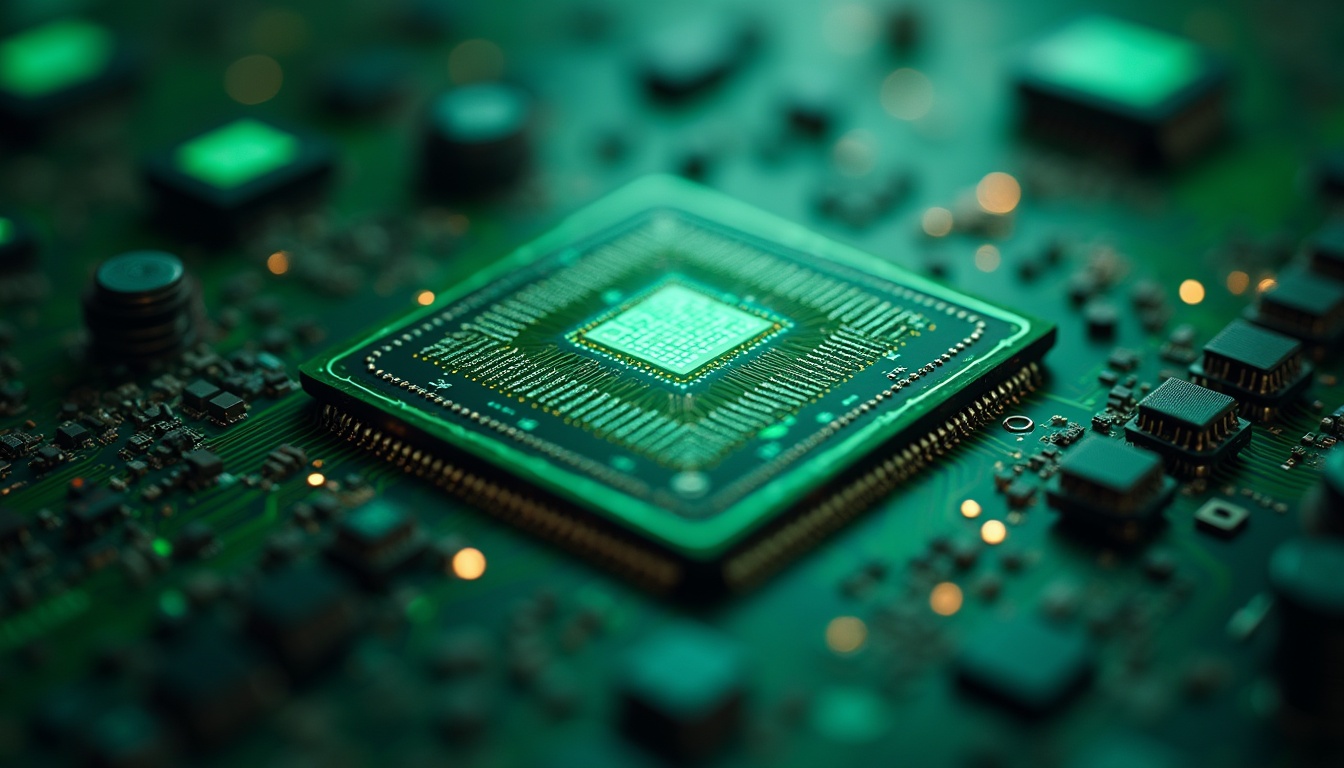In the rapidly evolving landscape of artificial intelligence, the competition between tech giants has intensified, particularly in the realm of AI chips. Google, a company synonymous with innovation and technological advancement, has recently made headlines with its strategic entry into the AI chip market. This move is seen as a direct challenge to Nvidia, a company that has long held a dominant position in this space.
As organizations increasingly rely on AI to drive efficiencies and enhance capabilities, the race for supremacy in AI chip development is not just about technology; it’s about shaping the future of industries and economies. The stakes are high as both companies vie for leadership in a sector that is pivotal to the advancement of AI applications. With Nvidia’s GPUs being the backbone of many AI systems, Google’s foray into this market signals a significant shift.
The implications of this competition extend beyond just hardware; they encompass software ecosystems, cloud services, and the overall direction of AI research and development. As we delve deeper into this rivalry, it becomes clear that the outcomes will have far-reaching consequences for businesses, developers, and consumers alike. Try iAvva AI coach app for free.
Key Takeaways
- Invest in leadership coaching for AI‑era decision‑making.
- Audit your [systems/vendors/processes] for dependency risks.
- Intergrate AI literacy into Corporate Training Programs.
- Google’s entry into the AI chip market poses a significant challenge to Nvidia’s dominance.
- The rise of artificial intelligence in technology has fueled the demand for more advanced AI chips.
- Google’s AI chip is expected to offer intense competition to Nvidia’s offerings in terms of performance and efficiency.
- Nvidia’s current dominance in the AI chip industry may face disruption with the introduction of Google’s AI chip.
- The competition between Google and Nvidia in the AI chip market will drive the future development of AI chip technology.
The Rise of Artificial Intelligence in Technology
Artificial intelligence has transitioned from a niche area of research to a cornerstone of modern technology. The rise of AI can be attributed to several factors, including advancements in machine learning algorithms, increased computational power, and the availability of vast amounts of data. According to a report by McKinsey, AI could potentially add $13 trillion to the global economy by 2030, underscoring its transformative potential across various sectors such as healthcare, finance, and manufacturing.
As organizations recognize the value of AI in driving innovation and efficiency, the demand for powerful computing resources has surged. This demand has catalyzed the development of specialized hardware designed to optimize AI workloads.
The emergence of new players in this field is reshaping the landscape, making it essential for established companies like Google and Nvidia to adapt and evolve.
Google’s Entry into the AI Chip Market

Google’s entry into the AI chip market is marked by its development of the Tensor Processing Unit (TPU), a custom-built chip designed specifically for machine learning tasks. Initially introduced in 2016, TPUs have been integral to Google’s cloud services and have powered various applications, from natural language processing to image recognition. By leveraging its expertise in software and data management, Google aims to create a competitive edge in the AI chip arena.
The strategic decision to develop its own chips reflects Google’s commitment to enhancing its AI capabilities while reducing reliance on third-party hardware providers like Nvidia. This move not only allows Google to optimize performance for its specific applications but also positions it as a formidable competitor in the broader AI chip market. As Google continues to innovate and refine its TPU technology, it is likely to attract interest from businesses seeking efficient and cost-effective solutions for their AI needs.
Nvidia’s Dominance in the AI Chip Industry
Nvidia has long been recognized as a leader in the AI chip industry, primarily due to its Graphics Processing Units (GPUs) that have become synonymous with high-performance computing. The company’s GPUs are widely used in data centers and by researchers for training complex machine learning models. According to recent data from IDC, Nvidia holds over 80% of the market share in the GPU segment dedicated to AI workloads, highlighting its dominance.
Nvidia’s success can be attributed not only to its cutting-edge hardware but also to its robust software ecosystem, including CUDA and TensorRT, which facilitate the development and deployment of AI applications.
However, as competitors like Google enter the fray with their own innovations, Nvidia must remain vigilant and continue to push the boundaries of what is possible with AI technology.
The Impact of Google’s AI Chip on the Market
The introduction of Google’s TPU into the market has significant implications for both consumers and competitors. For businesses leveraging cloud services, Google’s TPUs offer an attractive alternative to Nvidia’s GPUs, particularly for those already invested in Google’s ecosystem. The potential cost savings and performance enhancements associated with TPUs could lead to a shift in how organizations approach their AI infrastructure.
Moreover, Google’s entry into this space may spur further innovation across the industry as companies strive to differentiate their offerings. As competition intensifies, we can expect advancements in chip design that prioritize efficiency, speed, and scalability. This dynamic environment will ultimately benefit consumers by offering them more choices and improved-performing technologies.
Comparing Google’s AI Chip with Nvidia’s Offerings

When comparing Google’s TPU with Nvidia’s GPUs, several key differences emerge that highlight each company’s unique approach to AI chip design. TPUs are specifically optimized for tensor processing tasks commonly found in machine learning applications, allowing them to deliver exceptional performance for specific workloads. In contrast, Nvidia’s GPUs are versatile and can handle a broader range of computing tasks beyond just AI.
While TPUs excel in certain scenarios—such as training large-scale neural networks—Nvidia’s GPUs offer flexibility that appeals to a wider audience. Additionally, Nvidia’s extensive software ecosystem provides developers with tools that simplify the integration of AI into their applications. As organizations evaluate their options, they must consider factors such as workload requirements, existing infrastructure, and long-term scalability when choosing between these two powerful technologies.
The Potential Disruption of Google’s AI Chip on Nvidia’s Market Share
As Google continues to refine its TPU technology and expand its offerings, there is potential for disruption within Nvidia’s established market share. Businesses seeking cost-effective solutions may gravitate towards Google’s products if they demonstrate comparable or superior performance at lower prices. This shift could lead to a gradual erosion of Nvidia’s dominance in specific segments of the AI chip market.
Furthermore, as more organizations adopt cloud-based solutions that leverage Google’s infrastructure, the integration of TPUs into their workflows may become increasingly appealing. If Google successfully markets its TPUs as an efficient alternative to Nvidia’s GPUs, it could catalyze a broader trend toward diversification within the AI chip market.
The Future of AI Chip Development and Competition
The future of AI chip development is poised for rapid evolution as competition intensifies among major players like Google and Nvidia. As both companies invest heavily in research and development, we can expect breakthroughs that push the boundaries of performance and efficiency. Emerging technologies such as quantum computing may also play a role in shaping the next generation of AI chips.
Moreover, collaboration between hardware manufacturers and software developers will be crucial in driving innovation forward. As organizations increasingly adopt hybrid cloud strategies that combine on-premises infrastructure with cloud services, there will be a growing need for chips that can seamlessly integrate across environments. The ability to adapt to changing demands will be essential for companies looking to maintain their competitive edge.
Implications for Other Players in the AI Chip Market
The competition between Google and Nvidia has significant implications for other players in the AI chip market. Smaller companies and startups may find opportunities to carve out niches by focusing on specialized applications or developing innovative solutions that address specific pain points within industries. As larger companies dominate the mainstream market, these smaller players can thrive by offering unique value propositions.
Additionally, partnerships between established firms and emerging startups could lead to exciting collaborations that drive innovation forward. As the landscape continues to evolve, companies must remain agile and responsive to shifts in consumer demand while exploring new avenues for growth.
The Importance of AI Chips in Advancing Technology
AI chips are critical components in advancing technology across various sectors. They enable faster processing speeds and improved efficiency for machine learning tasks, which are essential for developing intelligent systems capable of making real-time decisions. As industries increasingly rely on data-driven insights, the demand for powerful AI chips is expected to continue growing.
Moreover, advancements in AI chip technology have far-reaching implications that extend beyond just performance improvements; they can also reduce the costs associated with deploying AI solutions. As more organizations gain access to affordable and efficient computing resources, we can expect the accelerated adoption of AI technologies across various sectors, including healthcare, finance, transportation, and others.
The Race for AI Supremacy – Google vs Nvidia
The competition between Google and Nvidia represents a pivotal moment in the evolution of artificial intelligence technology. As both companies strive for supremacy in the AI chip market, their innovations will shape not only their futures but also the trajectory of industries worldwide. With Google’s entry into this space challenging Nvidia’s long-standing dominance, we are witnessing a transformative period characterized by rapid advancements and fierce competition.
As organizations navigate this evolving landscape, they must remain informed about emerging technologies and trends while considering how these developments can enhance their operations. The race for AI supremacy is not just about chips; it’s about harnessing technology’s potential to drive meaningful change across society. Ultimately, this competition will lead to better products and services that empower businesses and consumers alike—an exciting prospect as we look toward the future of artificial intelligence.
In the rapidly evolving tech landscape, Google is intensifying its competition with Nvidia by advancing its AI chip technology. This move is part of a broader trend where tech giants are investing heavily in AI to gain a competitive edge. While Google’s focus is on AI chips, it’s worth noting how technology is also enhancing everyday experiences, such as with smartphones. For instance, an article on best iOS accessories highlights how innovative gadgets can significantly improve the functionality and user experience of iPhones, showcasing the diverse applications of technological advancements.
FAQs
What is Google’s AI chip competition with Nvidia?
Google is developing its own artificial intelligence (AI) chips to compete with Nvidia’s dominant position in the AI chip market. This move is part of Google’s efforts to enhance its AI capabilities and reduce its reliance on third-party chip suppliers.
Why is Google ramping up its AI chip competition with Nvidia?
Google’s decision to develop its own AI chips is driven by the increasing demand for AI processing power in its data centers and cloud services. By creating its own AI chips, Google aims to improve the performance and efficiency of its AI applications while reducing costs and gaining more control over its hardware infrastructure.
How does Google’s AI chip competition with Nvidia impact the AI chip market?
Google’s entry into the AI chip market intensifies the competition with Nvidia, which has been a dominant player in providing AI chips for data centers and AI applications. This competition is likely to lead to innovation, lower prices, and more options for customers in the AI chip market.
What are the potential implications of Google’s AI chip competition with Nvidia?
Google’s development of its own AI chips could disrupt Nvidia’s market position and potentially challenge its dominance in the AI chip market. This competition may also drive advancements in AI chip technology, leading to more diverse and specialized AI chip offerings tailored to various applications and industries.










Leave a Reply